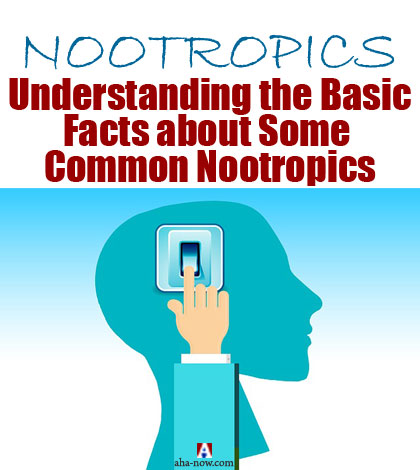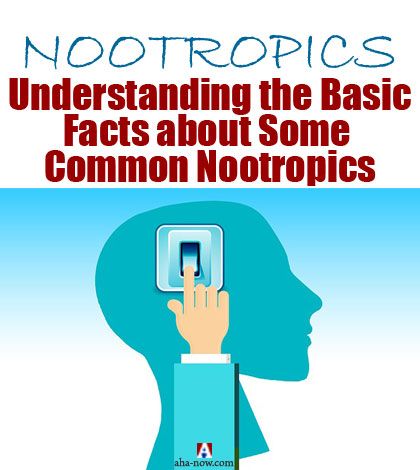Learn about brain health and nootropics to boost brain function
Understanding the Basic Facts about Some Common Nootropics


Natural Fiber
SupplementWe have over 80 flavors that
you can choose from, so
you always have a choiceNaturlax
If you intake caffeine, then you should know about Nootropics. Otherwise too, Nootropics may prove to be beneficial in many ways. Nootropics are supposed to be helpful in increasing your cognitive or mental functions like focus, intelligence, and memory. But there’s more information that you should read to understand nootropics better. ~ Ed.
What are Nootropics? What good can it do to you?
Nootropics are known as brain-boosters. They are also called smart drugs or supplements that enhance the cognitive functions such as intelligence, memory, and focus.
Here’s some more information about Nootropics. To start with the discovery of Nootropics, in 1972, CorneliuGiurgea, a Romanian chemist, coined the word Nootropics to describe the compounds that “could turn mind”.
Yes, Nootropics gives cognitive benefits to the human brain by enhancing memory and ability to learn. They are virtually non-toxic and possess very few side effects allowing the brain to function under disruptive conditions.
Nootropics also help the cortical and sub-cortical regions to improve their neuronal firing mechanism and they even protect the brain from adverse chemical changes.
Most of the Nootropics are sold in capsule forms but are also available in powder form in their basic state.
Nootropics are not medicines but smart drugs taken by a healthy person. Interested in knowing more about Nootropics? Read on.
How does Nootropics Work
Our brain has billions of neurons connected by synapses, which communicate and work together with the help of neurotransmitters. An increase in production and signaling of neurotransmitters boosts brain functions (like improved concentration, mood elevation, long-lasting memory and longer attention spans) effectively.
The improvement in synaptic plasticity of the neurons due to continued supplementation of nootropics can cause the long-lasting improvement to the health and functioning of the brain.
The flow of oxygen, nutrients, and blood (vasodilation) to the brain is increased with the intake of nootropics (smart drugs). Here, blood, oxygen, and nutrients are the primary sources of energy to the brain that helps the brain to work effectively as it constitutes 20% of our energy expenditure.
Some of the nootropics smart drugs supplements, which provide energy to the brain and enhance focus, mental energy, and clarity, are as follows –
- Caffeine
- Acetyl L- Carnitine
- Ginkgo biloba or Vinpocetine
- Creatine
Nootropics show signs of Neuro-preservation and Neuro-protection and even slows down the neuron damaging rate on the nootropic user. It slowdowns the speed of signs of aging like loss of memory and even inhibits the disorder development of Alzheimer’s disease.
Understanding the Basics of Nootropics
The nootropics taken by different persons have a different outcome. The same Nootropics can affect the same person differently depending on how it is taken.
Here are some key points to help understand this well:
You should take an adequate number of nootropics because the higher doses have several side effects and can outweigh the benefits more often whereas too low a dose might not show the main effect properly.
If you may take nootropics too many times in a day to maintain its effect, it may lead to overdosing. Overdosing of nootropics can lead to some unwanted side effects, which are as follows:-
Tolerance– When a person takes nootropic for the first time it has more effect in a lesser time (Honeymoon period) but as they become used to it, the same dose does not have any such effect. Tolerance limits the efficacy of nootropics by building resistance towards it. Sometimes the tolerance builds faster and that is the time when you should give time to our brain to regulate while taking time off nootropics.
Dependency– Sometimes you get habituated to nootropics just as in case of caffeine and alcohol. When you continually take the recommended doses of nootropics then suddenly quitting it will cause harsh symptoms in your body. So the time you start getting dependent on something, you should reduce its intake over a period of many days.
It is also known as ‘alternating’. In this process, you can periodically use different nootropics without allowing the body to get dependent on a particular drug and giving it a benefit of enjoying different compounds.
Examples of Some Common Nootropics
- Amphetamine and Dextroamphetamine (Adderall) – It is the drug used to increase focus and alertness in a human being. Specifically, it treats Attention Deficit Hyperactivity Disorder (ADHD). It has a few side-effects like – weight loss, nausea, anxiety, and
- Aniracetam – It reduces foster creativity and anxiety, and in adults, it boosts cognitive functions. It has side-effects like jaw tension, vertigo, and
- Ashwagandha (Withania somnifera) – It increases focus and effectively reduces anxiety even if there is too much stress. They help in reducing blood pressure and affect thyroid disorders; the major side-effect of ashwagandha is a headache.
- Bacopa monnieri – It enhances brain functions (thinking, learning, and memory). It has several side-effects which are as follows – frequent bowel movements, cramps, dry mouth, and It slows the rate of heartbeat. It worsens liver conditions, gastrointestinal obstructions and even leads to ulcers.
- Acetyl-L-Carnitine – It enhances the analyzing and computation power of a person. It causes fishy body odor and even causes gastrointestinal stress (like vomiting and diarrhea).
- Creatine – In sleep-deprived adults, creatine helps in enhancing mental functions and improve performances. They lead to anxiety, gain in weight and gastrointestinal issues.
- Donepezil (Aricept) – It helps us to complete complex tasks by improving the ability and memory. Donepezil helps to treat and analyze the signs of Alzheimer’s. It has some major side-effects including sleeplessness, appetite loss, and
- Huperzine A – It prevents degrading of acetylcholine (a neurotransmitter) hence improving short-term memory as well as long-term recognition. It leads to emphysema, ulcers, heart diseases and asthma.
- L-Deprenyl – It improves attention and even helps in planning and people count that on to be a mood booster. However, you should avoid taking it with any other combination of drugs and even food (like cheese) as it triggers high blood pressure.
- Ritalin – It enhances memory and focus. When you take an overdose of Ritalin it can lead to some side-effects such as – weight loss, nausea, reduced appetite and blurred vision.
- Tyrosine – It helps in improvement of all the activities performed by the brain (like memory and intellectuality). It leads to a headache, heartburn and joint pain.
- Alpha GPC – It acts as neuroprotector and also enhances the memory.
- Ginkgo biloba – It is also a mood booster and enhances memory.
- Lion’s Mane – It helps the person to fight from depression, keeps neuron healthy and also synthesizes the Nerve Growth Factor (NGF).
Side-effects of Nootropics
There are pros and cons to everything. All drugs and medications have their side-effects depending on many conditions.
While moderation is the way to go, here are the general side-effects of nootropics:
- For beginners – It mainly results in headaches and excessive sweating.
- For advanced users – It damages the brain of the user and also leads to a severe
Conclusion
Nootropics are in a class of neurological enhancing supplements that also includes many extracts, herbs, and medicines, which people use to improve the cognitive function.
Just like peptides, synthetic or natural, nootropics are smart drugs or cognitive enhancers used to boost cognitive functions, memory, intelligence, and attention.
While Nootropics don’t really deal with any specific health issues, people consider them to boost the overall health. However, they have their pros and cons and produce side-effects depending on their use and effect on your body.
I hope this information about Nootropics helps you understand about their nature, use, and how they work on your body.
Over to You
Have you ever tried any nootropics? Share your experiences or thoughts in the comments.
Click here to view full article